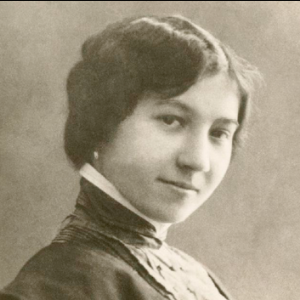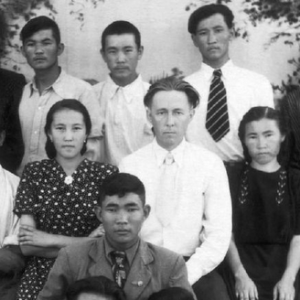His Life > Autobiography
Autobiography
Autobiography written by Solzhenitsyn for the Nobel Prize Committee
Published in Stockholm, 1971
I was born on December 11, 1918, in Kislovodsk. My father, a student in the philology department of Moscow University, did not complete the required program be¬cause he volunteered for the army in 1914. He became an artillery officer on the German front, served through the entire war, and died in the summer of 1918, half a year before I was born. I was brought up by my mother, a typist and stenographer, in Rostov-on-Don, where I spent my childhood and my teens. I finished high school there in 1936.
From the time I was very young I had had, on my own, a longing to become a writer and had written much of the usual youthful nonsense and, in the thirties, had made attempts to get published, but my manu¬scripts were not accepted anywhere. I had in mind getting a literary education, but Rostov did not offer what I wanted; to go to Moscow was impossible because of my mother’s being single and ill and our very modest means.
My mother raised me in very difficult conditions. She was widowed before I was born and never remarried, mainly because she was afraid that a stepfather would be too strict. We lived in Rostov for nineteen years before the war, and for fifteen of those we could not get a room from the state. All the time we had to find some broken-down little hut which we could rent from private owners for a great deal of money. And when we finally did get a room, it was part of a reconstructed stable.
It was always cold. There was a draft. The coal we used for heat was hard to get. Water had to be carried from afar. I actually only learned recently what running water in an apartment meant.
Mama knew French and English well, and had also studied shorthand and typing, but agencies that paid well never hired her, because of her social origin.
My only memory of my father is from photographs and the stories told by my mother and other people who knew him. While a student at the university he volunteered for the army, and he served in the Grenadier Artillery Brigade. Once when the battery was set afire, he saved some munitions boxes himself.
The three officer’s decorations that he left from World War I —which in my childhood were considered the mark of a dangerous criminal—were buried by my mother and me out of fear of a search. When the whole front was collapsing, my father’s battery remained on the front lines until the Treaty of Brest. My mother and father were married at the front by a brigade priest.
Papa returned home in the spring of 1918, and soon thereafter died as a result of an accident and poor medical care. His grave in Georgievsk was leveled by a tractor in the construction of a stadium.
Therefore I enrolled in the mathematics department of Rostov University; I had considerable aptitude for mathematics, I could do it easily, but it never appealed to me as a life’s work. However, it served as a benefactor in my destiny. At least twice it saved my life: probably I would not have survived eight years of the camps if, as a mathematician, I had not been assigned for four years to a so-called sharashka; and in exile I was allowed to teach mathematics and physics, which made life easier and gave me a chance to get down to the job of writing. If I had had a literary education, I doubt I would have come through my ordeals intact; I would have been under a great handicap. To be sure, I did begin literary studies later: from 1939 to 1941, along with the physics and math, I was a student in the correspondence department of Moscow’s Institute of History, Philosophy, and Literature.
In 1941, a few days before the beginning of the war, I graduated from the physics and math program of Rostov University. With the war’s outbreak, I, because of restrictions due to health, became driver of a wagon train and with it spent the winter of 1941-2. Only later—again thanks to mathematics—was I transferred to artillery school, where I completed the accelerated course by November 1942.
At that time I was appointed commander of a reconnaissance artillery battery and uninterruptedly held that position during my military service, never leaving the front, until my arrest in February 1945. That occurred in East Prussia, a place strangely connected with my destiny: as far back as 1937, while still a first-year university student, I selected as a topic the “Samsonov Catastrophe” of 1914 in East Prussia, studied all the books about it, and in 1945 with my own two feet walked the very same ground. (Now, in the fall of 1970, the book that deals with it, August 1914, is finished.)
I was arrested on the basis of censored extracts from my correspondence with a school friend in 1944-5, basically for disrespectful remarks about Stalin, although we referred to him by a pseudonym. Material complementing the “accusation” was rough drafts of stories and reflections found in my map case. Nevertheless, this was not sufficient for a “trial,” and in June 1945 I was “convicted” by a procedure that was then widespread — in my absence, by a decision of OSO (an NKVD Special Tribunal)—and sentenced to eight years in a labor camp (at that time this was considered a mitigated sentence).
At first I served my sentence in corrective labor camps of the mixed type (described in my play “The Love-Girl and the Innocent”). Subsequently, in 1946, as a mathematician, I was pulled out and transferred into the system of MVD-MGB scientific research institutes, and in that sort of “special prison” (The First Circle) spent the middle period of my sentence. In 1950 I was transferred to the then newly created special camps for political prisoners only. In such a camp in Ekibastuz in Kazakhstan (One Day in the Life of Ivan Denisovich) I worked as a laborer, bricklayer, and smelter. There I developed a cancerous tumor, operated on but not cured (its nature was recognized only later).
Following a month-long holdover at the end of my eight-year term, there came—without a new sentence and even without a “decree by the OSO”—an administrative decision not to free me but to send me to perpetual exile in Kokterek (southern Kazakhstan).
This was not something specially meted out to me but a measure widely used at that time. From March 1953 (on March 5, the day Stalin’s death was announced, I was for the first time let out on the street without guards) to June 1956, I served this exile. Here the cancer rapidly developed, and at the end of 1953 I was on the verge of death, unable to eat or sleep and infected by the tumor’s poisons. Released to go to Tashkent for treatment, however, during 1954 in the cancer clinic there I was cured (Cancer Ward, The Right Hand). During all the years in exile I taught mathematics and physics in a rural school and, given my austere and solitary way of life, secretly wrote prose (in camp, I could only compose verse by heart). I managed to preserve it and to bring it with me from exile into the European part of the country, where I continued to be outwardly busy teaching, secretly busy writing, at first in Vladimir District (Matryona’s House) and then in Ryazan.
Throughout the years up to 1961, not only was I convinced that I would never in my life see a line of mine in print but I also did not dare read anything to most of even my close friends for fear of divulgence. Finally, when I was about forty-two, this secretiveness as a writer began to oppress me very much. The heaviest burden was the impossibility of having my work commented on by sophisticated literary readers. In 1961, following the Twenty-second Congress of the CPSU and Tvardovsky’s speech at it, I decided to reveal myself and to offer One Day in the Life of Ivan Denisovich.
Such self-revelation seemed to me then —not without good reason—very risky: it could lead to the destruction of all my manuscripts and of me myself. But at that point things turned out happily; after extended efforts, A. T. Tvardovsky succeeded in bringing out my novella a year later. But publication of my things was stopped almost immediately; my plays were held up, as was, in 1964, my novel In the First Circle, which in 1965 was confiscated, along with my archives from years back.
In those months it seemed to me that it was an unforgivable mistake to have exposed my work prematurely and that I would not be able to complete it.
We almost never can evaluate and, through consequences, immediately become fully conscious of events which have already happened to us; all the more unpredictable and surprising for us is the course of events to come.




